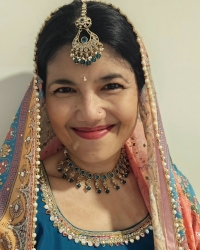Tamil (Hindu traditions) in South Africa

Photo Source:
Anonymous
|
Send Joshua Project a map of this people group.
|
| People Name: | Tamil (Hindu traditions) |
| Country: | South Africa |
| 10/40 Window: | No |
| Population: | 35,000 |
| World Population: | 3,640,000 |
| Primary Language: | Tamil |
| Primary Religion: | Hinduism |
| Christian Adherents: | 12.00 % |
| Evangelicals: | 1.50 % |
| Scripture: | Complete Bible |
| Ministry Resources: | Yes |
| Jesus Film: | Yes |
| Audio Recordings: | Yes |
| People Cluster: | South Asia Hindu - other |
| Affinity Bloc: | South Asian Peoples |
| Progress Level: |
|
Introduction / History
The homeland of the Tamil people is southeast India. Tamil is one of the major languages of India and the 17th most spoken language in the world. Tamils are proud of their cultural and literary heritage that dates back over 2000 years. Before the coming of the Europeans at various times, Tamils ruled an empire in south India and Southeast Asia. Many thousands of Tamils have left South India and live in dozens of countries throughout the world. Some migrated to South Africa in the 19th century when India and South Africa were both British colonies. The Tamils often came as indentured servants and laborers. The ability of the Tamils to speak English gave them an advantage in South Africa and in international business. A small fraction of Tamils of Hindu background in the South Africa has become followers of Jesus Christ.
What Are Their Lives Like?
During the time of apartheid, the Tamils in South Africa were victims of discrimination by the English and Dutch. They did not have the rights of the citizens of European descent. However, the Tamils fared better than the local African peoples. The Tamils and other Asians occupied what one could consider a lower middle-class position as shop keepers, clerks and lower governmental workers. Today most Tamils in South Africa fit into the middle class. Now they have the rights of citizens and may attend universities that once were reserved for whites. Tamil parents encourage their sons and daughters to obtain college educations and professional degrees. Some Tamils work in medicine, education, finance, science and engineering at the highest levels of South African society. Many Tamils today still own shops, small businesses and restaurants. The father is the head of the Tamil family. He shares leadership with his wife over the children. A woman has a higher place in the Tamil home than in most Asian and African cultures. Tamils in South Africa try to maintain their ethnic identity and at the same time become model South African citizens. In traditional Tamil culture, the parents chose the spouse of their children. This practice has changed in Western societies where children frequently choose their partner with their parents' guidance. Tamil parents strongly encourage their children to marry within their culture and caste.
What Are Their Beliefs?
The majority of Tamils living in South Africa practice Hinduism, the ancient religion of India. The patron god of the Tamils is Murugan, the Hindu god of war. Hindus worship and serve the gods of the Hindu pantheon. Hindus believe that by performing rituals and good works that they will attain moksha or freedom from the endless cycle of birth, death and rebirth. The Tamils visit Hindu temples and offer prayers, food, flowers, and incense to their gods in hopes of gaining protection and benefits. They do not have a personal or familial relationship with their gods as Christians do with their heavenly Father. There are many forms of Hinduism, each with its own deities and beliefs. The main yearly holidays of the Hindu Tamil people are Holi, the festival of colors and the start of spring, Diwali, the festival of lights, Navratri, the celebration of autumn and Rama Navami, Rama's birthday. South African Tamils also frequently celebrate Christian holidays. The Tamil New Year is celebrated on April 14.
Prayer Points
Pray the Lord raises up a Disciple Making Movement among the Tamils in South Africa in this decade. Pray the Lord moves South African believers and churches to reach out and share the good news with Tamil Hindus. Pray that more Christian literature, in